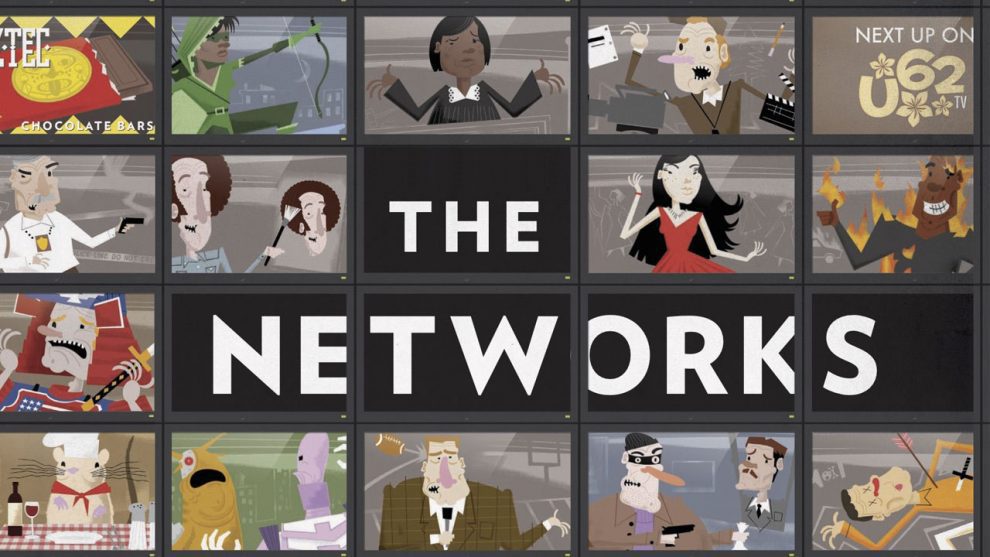Ahhh, the magic of television. All that most of us will ever see is the perfectly orchestrated dance of daytime dramas, serial sitcoms, and primetime premieres; but there is so much more going on behind the scenes. To be honest, though, do we really want to see what goes on once the camera cuts? Maybe our sense of curiosity is enough to wonder, but I choose to believe that once the veil is lifted, the magic of television will be lifted as well.
Luckily, we can pretend like we know how to run a television network without losing that magic. Even better, it can be fun, humorous, and full of parody. Sounds like a great primetime special to me!
Enter The Networks.
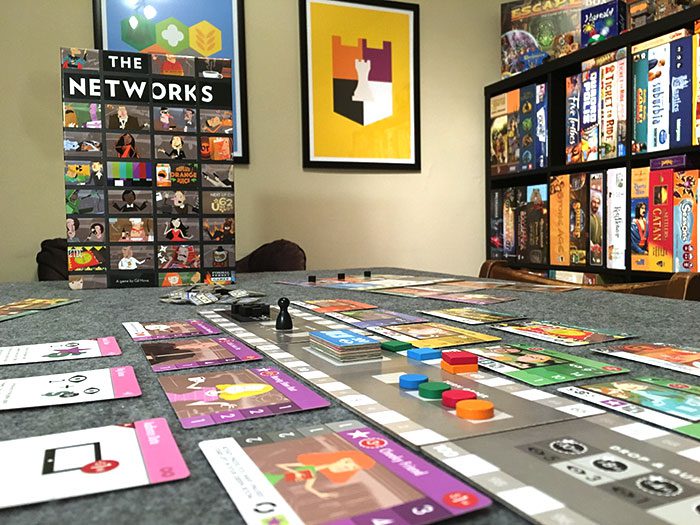
Overview
The Networks has been one of the hottest games of the year. It was in the ranks with the other hotness at Gen Con this year and copies were quick to sell out. Formal Ferret Games seems to have found a hit with only their second full release. Though their first release, Bad Medicine, did well, It had nowhere near the success that The Networks seems to have garnered.
The Networks is a game about bringing a small local network into the big world of national primetime television. Will you have what it takes to make it to the top? The game might sound pretty serious, but in reality it doesn’t take itself seriously at all. Throughout the course of this game, you will be developing parody TV shows, hiring stereotypical stars, and landing humorous ads in order to gain millions of new viewers.
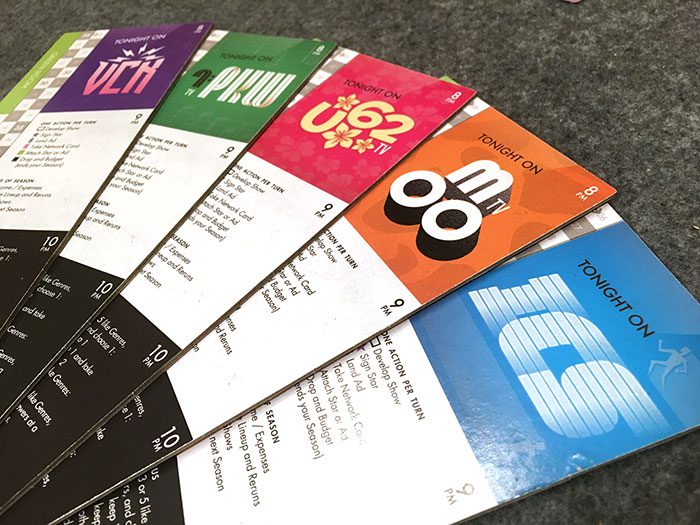
The game takes place over five different seasons. During each season, players take turns developing shows, hiring actors, landing ads, and taking powerful network cards until they are done taking actions or can not take any more. Once all players have finished taking actions, all shows are scored and a new season begins. After five seasons have passed, each player scores their shows one more time and the game comes to a close. The player with the most viewers at the end of the game wins!
Gameplay
The Networks is a game that emulates running a television network by allowing you to schedule TV shows within three different time slots (8, 9, and 10pm). Each show has a prefered time slot that brings in more viewers in its first season when placed in the correct slot in the lineup. This creates an interesting puzzle of trying to fit everything in its place, just right, without losing any potential viewers.
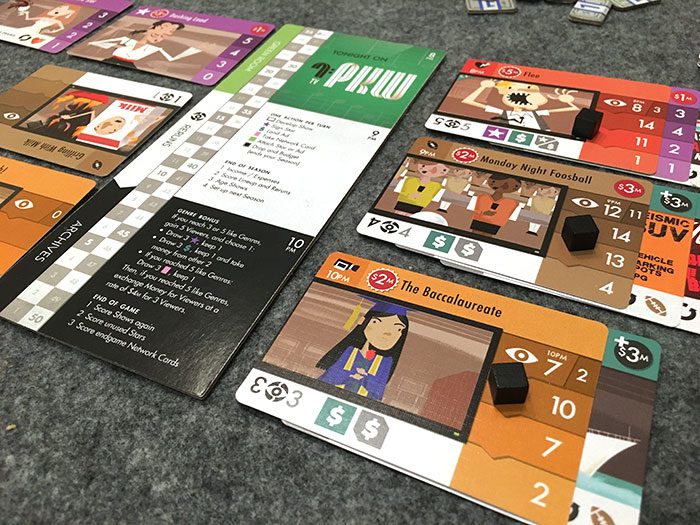
Perfect Planning
In addition to searching out shows with specific timeslots, you will also be trying to collect sets of shows of a particular genre (action, drama, reality, sci-fi, sitcom, and sports). At times you will desperately want to develop a show that would complete a set and gain a large bonus, but in order to do that you’ll need to retire a show that will score you lots of points at the end of the round. These kinds of decisions really keep the game fresh throughout its five rounds. You will constantly be trying to figure out the best way to make everything work as seamlessly as possible. Unfortunately, that is much harder than it sounds.
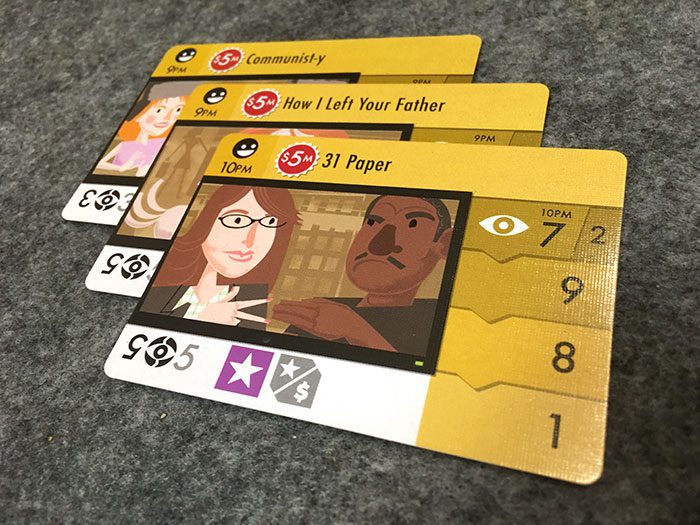
Speaking of bonuses, the set bonuses are extremely beneficial and often overlooked. In each game I played, it seemed that players didn’t really understand just how beneficial the set bonuses were until at least the fourth season. Once someone got their first set, everyone else seemed to scramble to make theirs happen. The bonuses come when you collect a set of three and then again with a set of five cards of one genre. Gaining free followers in addition to a free ad (along with some income), star, or network card really gives a boost that can make a huge difference.
Thematic Parallels
The Networks brings a lot to the table when it comes to its ability to both be friendly and fun, but also thinky and hard. Each choice makes a big difference and skilled players must make the best of each decision in order to pull off the win. At the same time, the game’s humor and elegance also leads to games that are friendly to those of less experience as well.
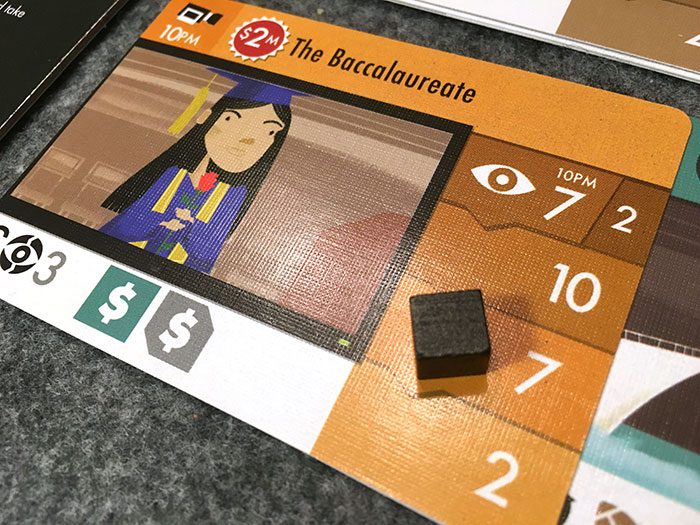
A lot of the mechanics of this game just “make sense.” For example, every season when a show is scored, it “ages” and is worth more or less viewers the next season. There are times when you see shows that are clearly “one hit wonders” that have phenomenal first seasons that bring in lots of fans, but then their second, third, and fourth seasons barely bring fans at all. Similarly, you’ll see “cult classics” that have a poor reception up front, but then gain tons of fans later on. These kinds of thematic parallels with the real world of television make the game much easier to pick up and jump into.
Action Packed Seasons
Like I mentioned before, The Networks is both simple and complex at the same time. One of the most elegant parts of the game is how quick and easy it can be for a player to take their turn. There are really only six options at any given time:
Develop a show
Grab a show from the available options, pay its cost (shown in the top left corner), and place it in one of your timeslots. If replacing a show, discard any previously attached stars and/or ads and move the old show into the reruns slot. Shows are the main way that you will gain viewers throughout the game, so developing the best shows for your lineup is very important!
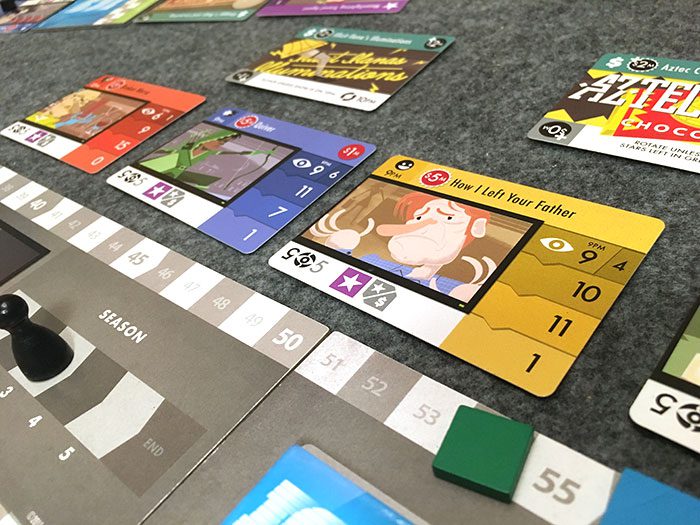
Sign a Star
Grab a star from the available options, pay its cost (shown in the top left corner), and place it in your green room. When attached, stars increase the number of viewers that a show will earn. These can also make a big difference in your overall scoring!
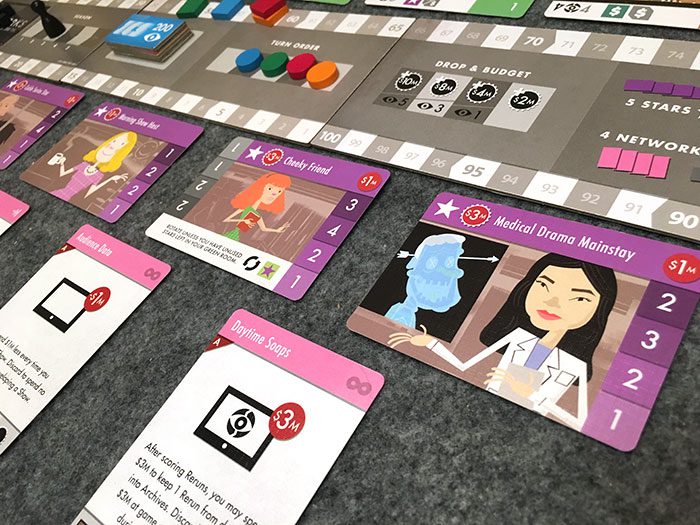
Land an Ad
Grab an ad from the available options, gain the landing income listed (shown in the top left corner), and place it in your green room. When attached to shows, ads bring in seasonal income (shown in the top right corner) at the end of each season. The income from these ads can balance out the seasonal cost of most shows and stars. By keeping this balance, these cards play a big role in making sure you maintain income throughout the game.
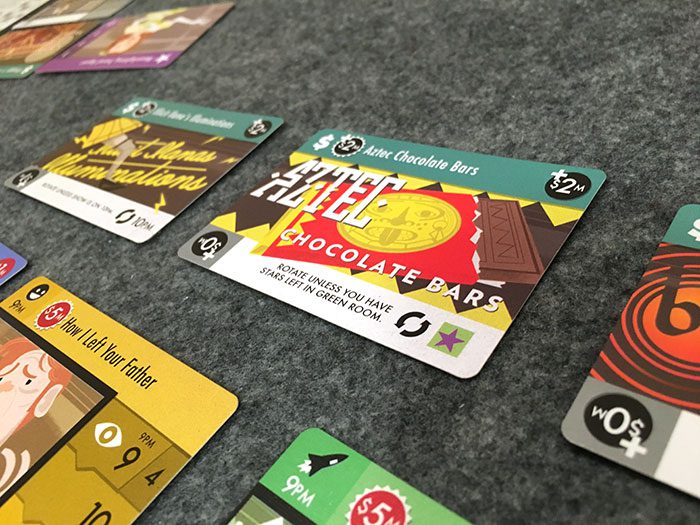
Take a Network Card
Grab a network card from the available options. These cards do not cost anything and often disappear quickly due to their powerful abilities. Each one will give you a unique power that will break the rules for you with either a one time ability or a constant effect throughout the rest of the game. Some cards even provide powerful end game scoring bonuses.
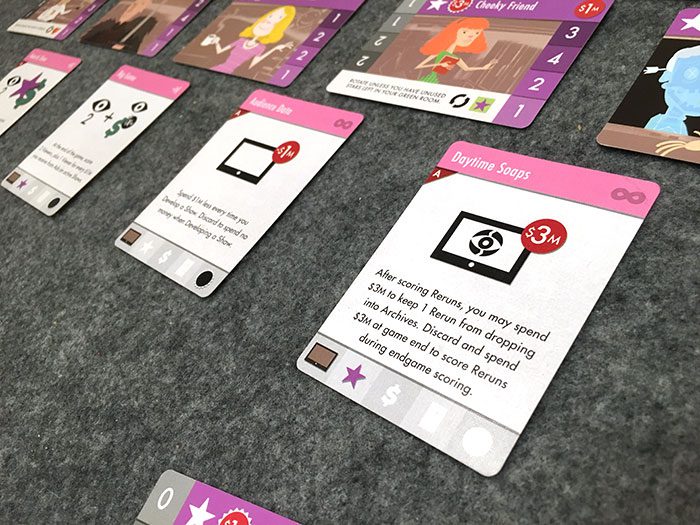
Attach a Star or Ad
Take one of your stars or ads from your green room and attach it to a show with an available slot. Each show will have a fixed amount of stars or ads that can be attached, so you have to be careful about where you place them. Furthermore, different ads become less beneficial if they do not meet certain requirements (i.e. if the show is not on its prefered time slot). It is also worth noting that some shows actually require you to attach a star immediately when it is developed, so sometimes you don’t even have to take an extra action!
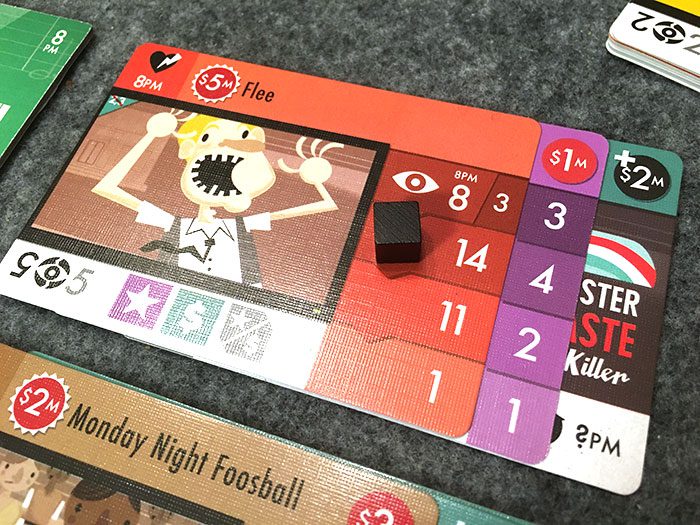
Drop and Budget
Take your player order token and place it in the first open slot in the Drop and Budget section of the board. The earlier you decide to drop out of the round, the more bonus viewers and revenue you will receive. These bonuses often give large boosts to the players who are first to drop. Of course, those players will also take fewer actions. The tension that the Drop and Budget action creates is extremely prevalent throughout each season. Dropping early allows you to gain an immediate advantage, but at the cost of ending your actions, is it really worth it? Yes! No! Maybe? Of course, being the last to drop means that you can take as many actions as you want!
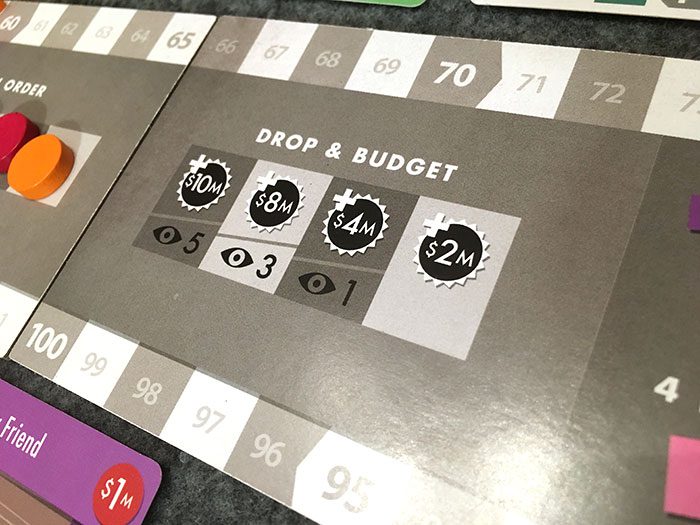
Six simple actions. That’s it. One of the biggest strengths of The Networks is its ability to trick you into thinking that it is simpler than it actually is. In reality, The Networks is filled with complex puzzles of determining the most effective combinations of shows, ads, and stars; yet all of these decisions are filled with so much theme, humor, and simplicity that it is easy to play through a game without really delving too deep into the strategy.
Season Wrap and Renewal
Just like any great show, all seasons come to an end. Most at least gain a second season, but not all are so lucky! In The Networks, once all players have taken the Drop and Budget action, the season ends and scoring begins. First, each player gains income from their well placed ads or pays their debts brought on by their expensive show/star combos. Next, players score viewers for each of their shows based on the show’s current season and its star’s bonus. Once all of the viewers are tallied and added to the score track, all shows age. This means their scoring cubes move down to their next individual season. After everything has been scored and wrapped up, a new set of shows, stars, ads, and network cards are flipped over to form the available options for the following season.
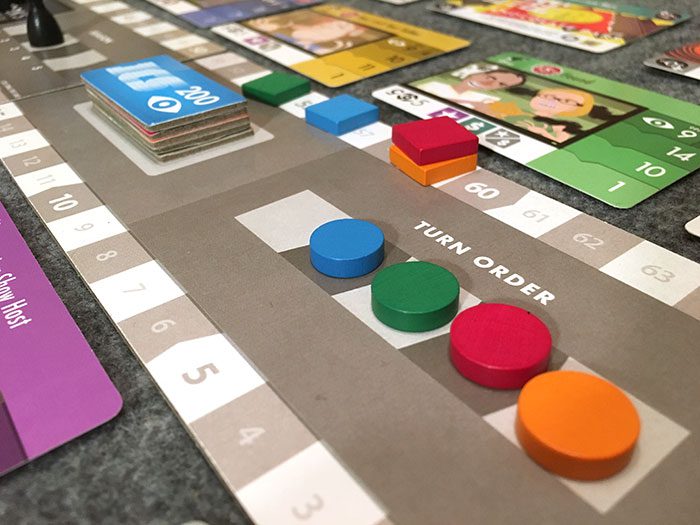
A Critic’s Thoughts
The Networks was quite the surprise for me. I had heard lots of good things, but after my initial glance at the strange board layout, I was put off a bit. I’m glad that I was able to give the it a fair chance though, because I’ve really enjoyed my time with the game. In its essence, The Networks is really just an extremely thematic drafting game. Outside of the “interactive” network cards (which I chose not to play with), there really isn’t much player interaction. Honestly, that’s alright with me. To me, drafting is more about forcing your opponents to make suboptimal decisions while leaving room for yourself to still make the most optimal decisions. The Networks establishes this very well while still including the optional “interactive” cards for those who itch for a little more direct player interaction.
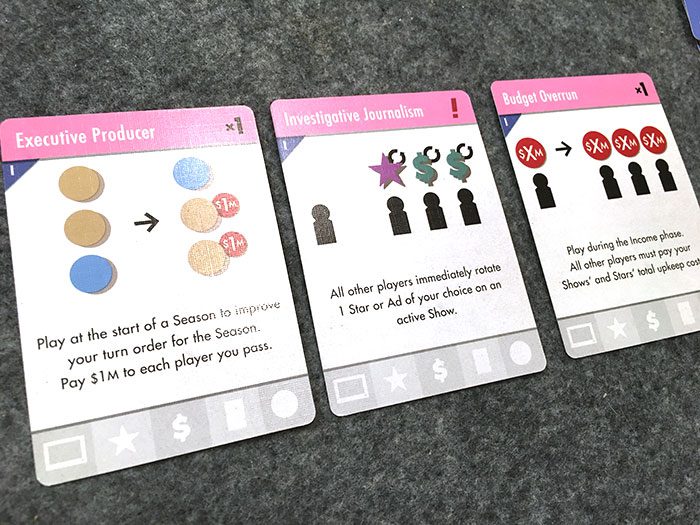
Still, no game is perfect and the Networks still has its fair share of problems.
As I mentioned before, I am not a fan of the long and narrow board layout that houses the scoring track, player order track, and drop and budget bonuses. Considering that The Networks is really a card game with player boards, I found the awkward placement of the center board out of place and often in the way.I would have much rather had a smaller board to put to the side so that I could free up room for the cards. Since the board forces a specific orientation for the game, the cards must often be placed in areas that are not ideal for all players to see and read. I suppose you could just take it and set it to the side, but because of it’s length, that is not ideal for all groups.
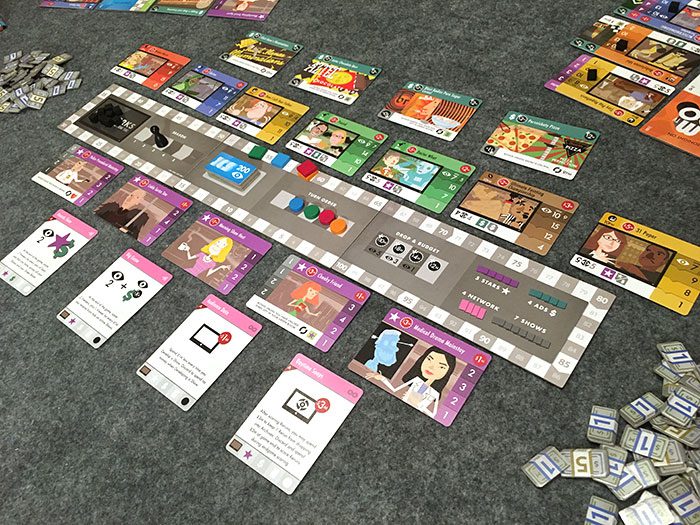
The few flaws I found in this game were easily easily outweighed by it’s strengths. One of my favorite parts of The Networks was the collective “discovery” that takes place for all players involved. As each new season brings in new show cards, my play groups had the opportunity to collectively find joy in examining each of the cards that boast hilarious parodies of modern television shows. Though this phase of discovery only lasts for the first couple games, it was a memorable part of the experience nonetheless. With an infinite pool of possible pop culture references, there is plenty of room to expand the game with more show cards. I look forward to engaging this feeling of discovery again with future expansions.
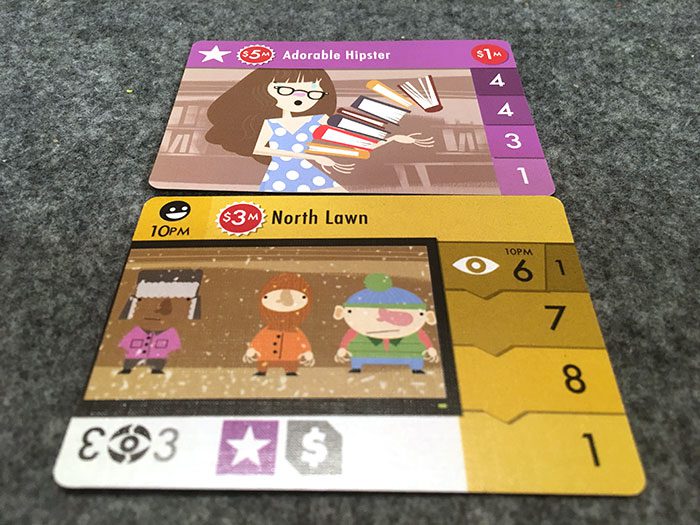
While the shows brought out lots of laughs, I found the star cards a little lackluster in comparison. Sure there is still lots of humor to be had in placing an ironic character type onto a mismatched show, but unlike the direct parody in the show cards, the star cards only reference certain actors in likeness instead of name. For example, while I recognize that “Adorable Hipster” is a reference to Zooey Deschanel, it does not evoke a laugh the same way that “North Lawn” does. Surely this had to be have at least explored in development. Still, I can only imagine the work it would take to come up with clever jokes for each and every star… On second thought, maybe the right decision was made.
Finalé
All-in-all, I really enjoyed The Networks. It is approachable, funny, and smart all at the same time. I know that this is a game that I can bring out with newer gamers because they will have a blast with the theme, yet I can also bring it out with more hardcore gamers due to its subtle depth. Gil Hova of Formal Ferret Games has created an impressive gem; One which points to a bright and successful future for this indie publisher. I can’t wait to see what kind of cards and new ideas will make their way into future expansions. Any game that can make me want more while still feeling like a complete and final product has something special going for it.
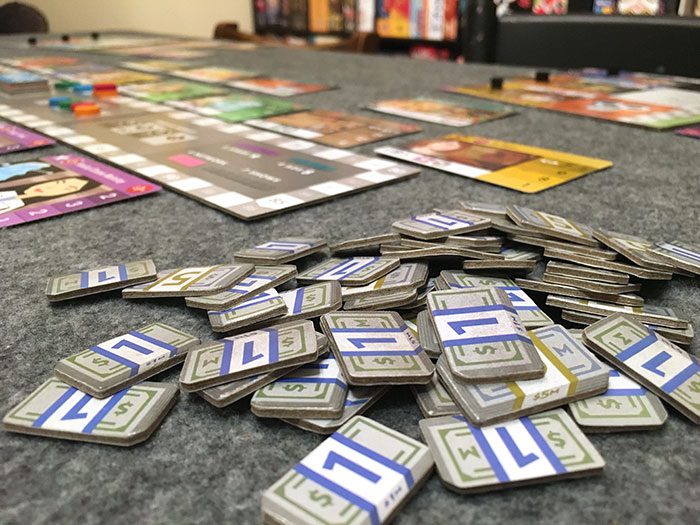
Honestly, The Networks is a pretty easy recommendation for me. If you enjoy open drafting, parodic humor, and quirky art, it should be an easy grab for you as well.
Does this one sound like a primetime hit or will you be waiting for the reruns?! Let us know what you think in the comments below!
If The Networks seems up your alley and you happen to live in or around the Nashville area, you might just be in luck! Formal Ferret Games has partnered with us to sponsor this month’s Nashville Game Night! All you have to do is show up to be entered in our giveaway of a copy of the game! Check out our event page for more info and block off your schedule for this Thursday, September 15th!


